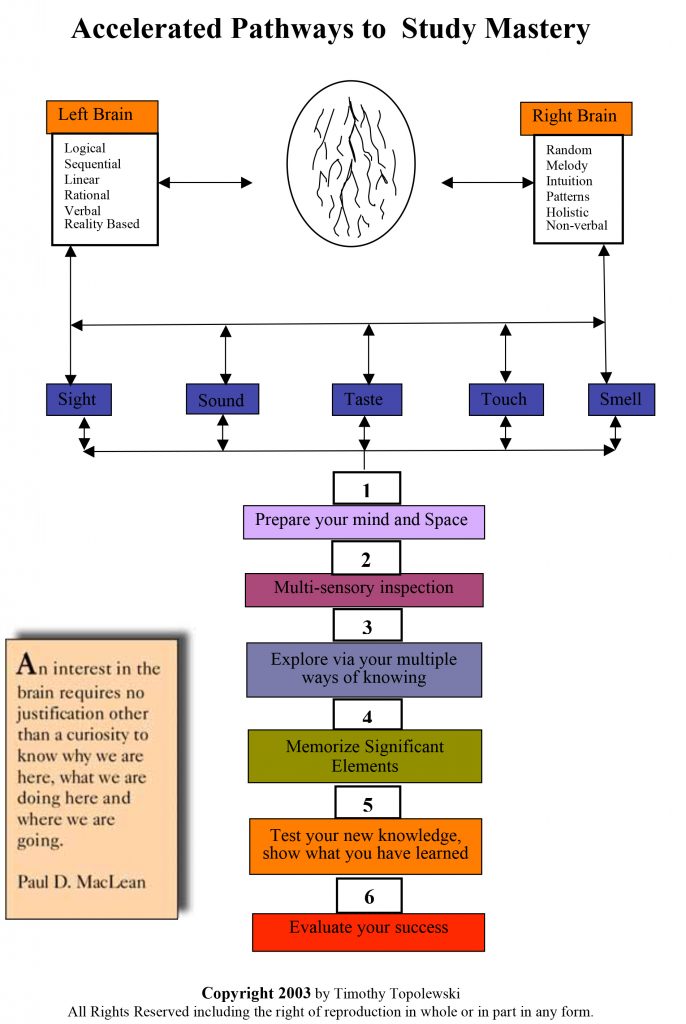Clinics
This clinic represents the practical applications of a decade of research on whole brain learning.
Whole brain learning:
One of the biggest problems facing all of us today is the huge number of things that we need to accomplish in a short amount of time. The need to acquire and apply new information is a fact of our everyday existence. Time remains an irrefutable law of nature and controls every part of our existence. We cannot call it back, stop it, or even sustain it. However, we can and must control its meaning and quality.
If you are an active conductor at the amateur, public school level, or a conductor at the college or professional ranks, a significant part of your job takes the form of learning new scores. It is the single most important challenge confronting us at all levels. It may be a matter of finding a sufficient amount of time to study or it may be a matter of being physically and mentally motivated when you do have the time. It may be that your approach to learning the new material is not systematized or you don’t feel confident in your learning because of past failures.
Situation
After months of preparation, you find yourself in a room with a number of other musicians, performers, conductors…applicants. You are all there to interview and audition for the masterclass, clinic session, or conducting vacancy. Just like you, everyone is well studied, well rehearsed, and motivated. Even the music is memorized. You look around, amazed at what you hear from your talented competition. Soon you begin to experience feelings of self-doubt. You feel increasingly inadequate and even begin to think that you are not good enough to take this interview. You try to fight it but you become more nervous: cold feet, clammy hands, mind unable to focus. And guess what: you come away from the experience feeling that you did not achieve the level of perfection you had spent so many hours working toward. Does this sound familiar?
Good news! Recent studies in learning theory and how the brain processes sensory input have yielded more
information in the past decade than at any other time
With an ever-increasing emphasis on time, it is wise to evaluate how we learn
and how we can make more efficient use of the time we can control.

What you will get from this clinic
During this clinic session you will be exposed to some of the most current and exciting thoughts on the brain and its capacity for learning. The techniques and suggestions presented do work and will greatly enhance your score study productivity.
Every new score teaches us new lessons. The master conductor is the conductor who has learned how to process a score based on his/her natural learning style.
This material has been highly acclaimed at numerous venues including Michigan State University, University of Michigan, Midwest Band and Orchestra Conference, MENC, CBDNA, the National Band Association Conference, NYSBDA and many state and local Teacher In-Service conferences. If you have any questions concerning this clinic topic and would like further clarification, or would like to book a clinic session for your school, please contact me at 315- 212 -1917
What this clinic is
This clinic presents a review of current research that relates to how our brain takes in, retains, and recalls information. As such, its greatest goal is to reconcile current educational research findings with current methodologies in the study of the conductor’s score. I began by asking: what does it mean when we say we know something, anything? Next, what does current research tell us about how we should proceed in learning it in the most rapid and efficient fashion? Asking specific questions enabled me to focus my effort while sifting through a considerable amount of research material.
How this clinic is unique
The selection, application, and interpretation of the research reflects my questions, successes and struggles with our educational system, a system that has been referred to as the “one chance” system. Either you get it or you don’t. If you don’t, we must go on anyway…time demands it. My conclusions and interpretations may best be viewed as the beginning of a bridge between pure research on one side and the possible applications of its findings on the other.
Because my goals and area of interest were specific, I have selected research that I feel has significant meaning to my topic: score study. The conclusions and applications offered are my interpretation of the research that is in its infancy. Topic areas discussed in the session include: multi-sensory learning, basic brain fitness, brain neurology, mind mapping, the application of Gardner’s theories of multiple intelligences to score learning and a review of current memory enhancement techniques.